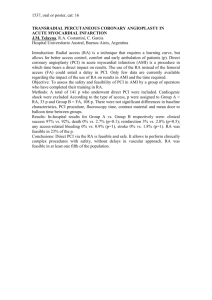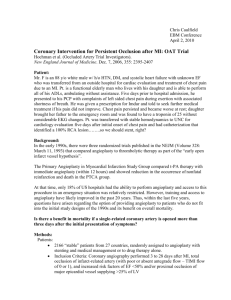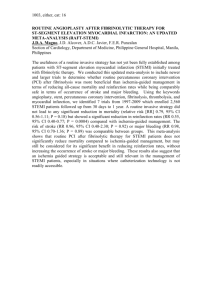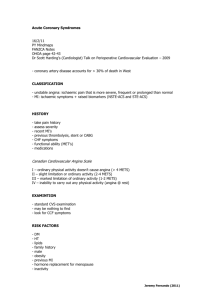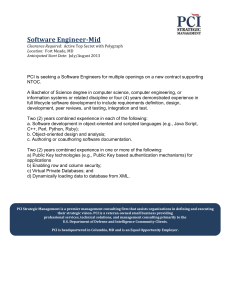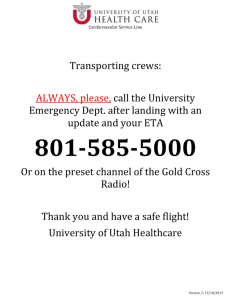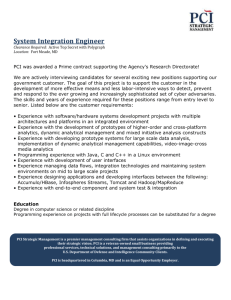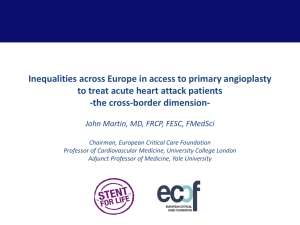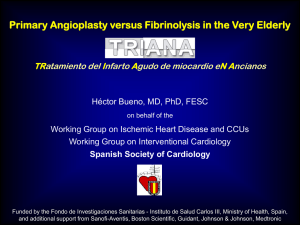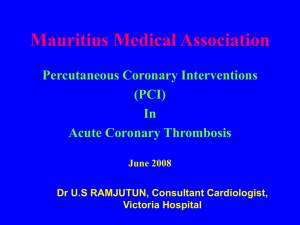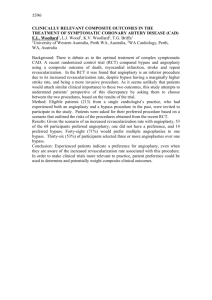Acute Coronary Syndrome - Journal Summaries
advertisement
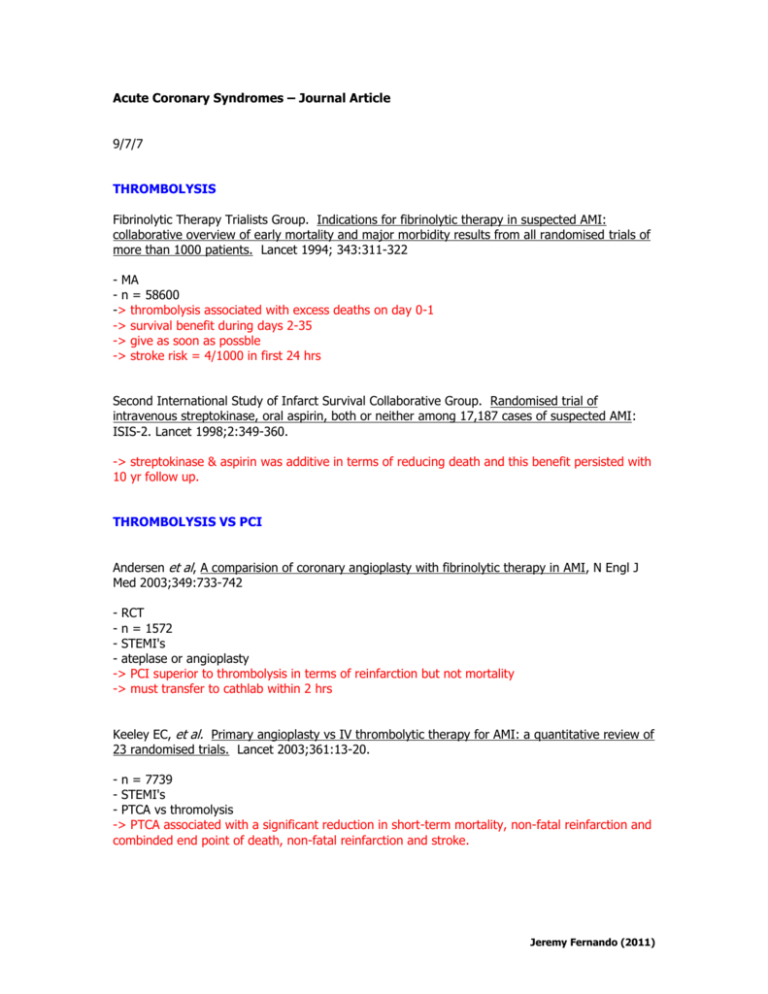
Acute Coronary Syndromes – Journal Article 9/7/7 THROMBOLYSIS Fibrinolytic Therapy Trialists Group. Indications for fibrinolytic therapy in suspected AMI: collaborative overview of early mortality and major morbidity results from all randomised trials of more than 1000 patients. Lancet 1994; 343:311-322 - MA - n = 58600 -> thrombolysis associated with excess deaths on day 0-1 -> survival benefit during days 2-35 -> give as soon as possble -> stroke risk = 4/1000 in first 24 hrs Second International Study of Infarct Survival Collaborative Group. Randomised trial of intravenous streptokinase, oral aspirin, both or neither among 17,187 cases of suspected AMI: ISIS-2. Lancet 1998;2:349-360. -> streptokinase & aspirin was additive in terms of reducing death and this benefit persisted with 10 yr follow up. THROMBOLYSIS VS PCI Andersen et al, A comparision of coronary angioplasty with fibrinolytic therapy in AMI, N Engl J Med 2003;349:733-742 - RCT - n = 1572 - STEMI's - ateplase or angioplasty -> PCI superior to thrombolysis in terms of reinfarction but not mortality -> must transfer to cathlab within 2 hrs Keeley EC, et al. Primary angioplasty vs IV thrombolytic therapy for AMI: a quantitative review of 23 randomised trials. Lancet 2003;361:13-20. - n = 7739 - STEMI's - PTCA vs thromolysis -> PTCA associated with a significant reduction in short-term mortality, non-fatal reinfarction and combinded end point of death, non-fatal reinfarction and stroke. Jeremy Fernando (2011) PCI Morce MC, et al. A randomised comparison of a sirolimus-eluting stent with a standard stent for coronary revascularization. N Engl J Med 2002;346:1773-1780. - RCT - n = 238 - uncoated vs sirolimus-eluting stents - single, primary lesions in native coronaries -> at 6 months significant reduction in neo-intimal proliferation and degree of stent stenosis -> at 1 yr there is a significant reduction in major cardiac events Di Mario, C. et al (2008) “Immediate angioplasty versus standard therapy with rescue angioplasty after thrombolysis in the Combined Abciximab REtetplase Stent Study in Acute Myocardial Infarction (CARESS-in-AMI): an open, prospective, randomized, multicentre trial” Lancet 371:559-68 - MRCT - open - n = 600 - inclusion criteria: <75 years, one or more high risk features (STEMI, new LBBB, previous MI, Killip class 2 – creps and elevated JVP, EF < 35%) - exclusion criteria: previous CABG or PCI with graft or stented vessel, cardiogenic shock, need for concomitant major surgery, severe renal or hepatic impairment, MI within two weeks, contraindications to the drugs - all treated with half dose reteplase, aspirin, heparin, abciximab - immediate transfer for PCI VS management at local hospital then transferred if ST elevation persisted > 90min or clinical deterioration - primary end points = death, reinfarction or refractory ischaemia @ 30 days -> immediate transfer for PCI improves outcome in high risk patients with STEMI -> no significant increase in major bleeding or strokes -> criticism: generalizability to our situation -> these patients are an incredibly few and high risk, primary outcome only significant when sub-groups combined not individually. Jeremy Fernando (2011) Jeremy Fernando (2011) Jeremy Fernando (2011) MEDICAL MANAGEMENT The Epic Investgators. Use of a monoclonal antibody directed against the platelet glycoprotein IIb/IIIa receptor in high-risk coronary angioplasty. N Engl J Med 1994; 330:956-961 - RCT - n = 2099 - abcixmab vs placebo - severe unstable angia, evolving acute MI or high risk plaque morphology -> significant reduction in death, non-fatal MI, unplanned repeat PCI & surgical revascularisation First International Study of Infarct Survival Collarborative Group. Randomised trial of Intravenous atenolol 16, 027 cases of suspected AMI: ISIS-1. Lancet 1986; 2:57-66 - RCT - n = 16,027 - atenolol vs placebo -> atenolol group had significant reduction in mortality @ 1 yr Magnesium in Coronaries (MAGIC) Trial Investigators. Early administration of IV Magnesium to high risk patients with AMI in the Magnesium in Coronaries Trial. Lancet 2002;360:1189-1196. - RCT - n = 6213 - STEMI given Mg2+ or placebo -> no change in 30-day mortality The Platelet Receptor Inhibition in Ischemic Syndrome Management in Patients Limited by Unstable Signs & Symptoms (PRISM-PLUS) Study Investigators. Inhibition of the platelet glycoprotein IIb/IIIa receptor with tirofiban in unstable angina and non-Q wave MI. N Engl J Med 1998;338:1488-1497 - RCT - n = 1915 - groups aspirin + (1) tirofiban, (2) unfractionated heparin, (3) tirofiban + heparin -> tirofiban + heparin experienced lower incidence of death, MI or refractory ischaemia within 7 days -> no significant increase in bleeding compared to those receiving heparin Petersen JL, et al. Efficacy and bleeding complications among patients randomized to enoxaparin or UFH for antithrombin therapy in non-ST segment elevation acute coronary syndromes: a systematic review. JAMA 2004; 294:89-96. - systematic review -> enoxaparin is better than UFH in preventing combined end point of death or MI without an increase in bleeding. Jeremy Fernando (2011) Yusuf S, et al. The Clopidogrel in Unstable Angina to Prevent Recurrent Events Trial Investigators. Effects of clopidogrel in addition to aspirin in patients with ACS without STsegment elevation. N Engl J Med 2001; 345:494-502. - RCT - n = 12,562 - patients presenting with 12hr from onset of symptoms -> 20% relative reduction death, MI & stroke. -> significant increase in bleeding Jeremy Fernando (2011)
